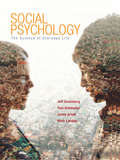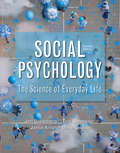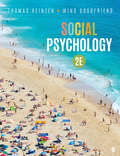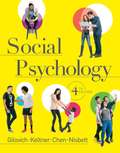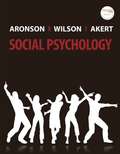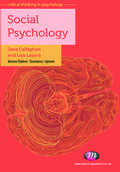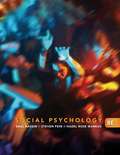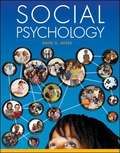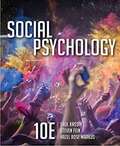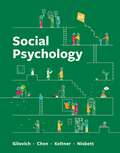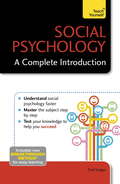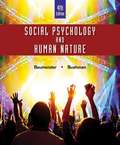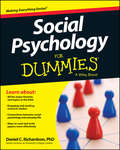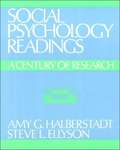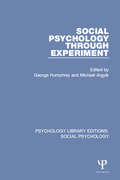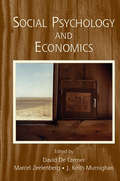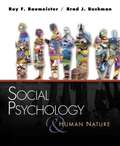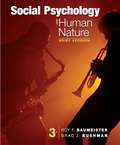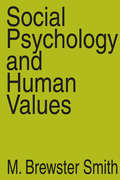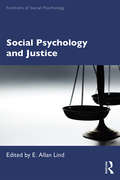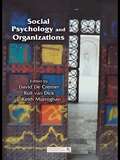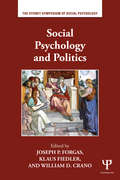- Table View
- List View
Social Psychology
by Jeff Greenberg Toni Schmader Jamie Arndt Mark LandauThis remarkable new textbook offers a fresh approach to the study of social psychology, integrating theory, research, and applications into a coherent, contemporary portrait of the field that no other available text can match. Drawing on over 50 years of combined teaching and research, Greenberg, Schmader, Arndt, and Landau guide students through the rich diversity of the science of social psychology and its insights into everyday life. The book introduces students to five broad perspectives on human social behavior: social cognition, cultural psychology, evolutionary theory, existential psychology, and social neuroscience. With these perspectives serving as recurring themes, each chapter organically weaves together explanations of theory, research methods, empirical findings, and applications, showing how social psychologists accumulate and apply knowledge toward understanding and solving real-world problems. New! LaunchPadSocial Psychology: The Science of Everyday Life has its own dedicated version of Worth Publishers' new online course space, LaunchPad. LaunchPad offers acclaimed media content, curated and organized for easy assignability and presented in an intuitive interface that combines power and simplicity. See what's in the LaunchPad
Social Psychology
by Jeff Greenberg Toni Schmader Jamie Arndt Mark LandauThis remarkable new textbook offers a fresh approach to the study of social psychology, integrating theory, research, and applications into a coherent, contemporary portrait of the field that no other available text can match. Drawing on over 50 years of combined teaching and research, Greenberg, Schmader, Arndt, and Landau guide students through the rich diversity of the science of social psychology and its insights into everyday life. The book introduces students to five broad perspectives on human social behavior: social cognition, cultural psychology, evolutionary theory, existential psychology, and social neuroscience. With these perspectives serving as recurring themes, each chapter organically weaves together explanations of theory, research methods, empirical findings, and applications, showing how social psychologists accumulate and apply knowledge toward understanding and solving real-world problems. New! LaunchPadSocial Psychology: The Science of Everyday Life has its own dedicated version of Worth Publishers' new online course space, LaunchPad. LaunchPad offers acclaimed media content, curated and organized for easy assignability and presented in an intuitive interface that combines power and simplicity. See what's in the LaunchPad
Social Psychology
by Thomas E. Heinzen Wind GoodfriendThis award-winning text invites students to discover social psychology’s relevance to their lives. Authors Thomas Heinzen and Wind Goodfriend capture student interest by weaving stories drawn from their own personal experiences with compelling examples from everyday life, all carefully placed in historical context. Social psychology is presented as an evolving, science-driven conversation; chapters build on core questions central to scientific inquiry, while a methods-in-context approach cultivates psychological literacy. The Second Edition has been thoroughly updated with new pop culture examples, additional diversity coverage, recent controversies related to the Zimbardo and Milgram studies, and over a hundred new citations from the latest research. This title is accompanied by a complete teaching and learning package.
Social Psychology
by Thomas E. Heinzen Wind GoodfriendThis award-winning text invites students to discover social psychology’s relevance to their lives. Authors Thomas Heinzen and Wind Goodfriend capture student interest by weaving stories drawn from their own personal experiences with compelling examples from everyday life, all carefully placed in historical context. Social psychology is presented as an evolving, science-driven conversation; chapters build on core questions central to scientific inquiry, while a methods-in-context approach cultivates psychological literacy. The Second Edition has been thoroughly updated with new pop culture examples, additional diversity coverage, recent controversies related to the Zimbardo and Milgram studies, and over a hundred new citations from the latest research. This title is accompanied by a complete teaching and learning package.
Social Psychology (4th edition)
by Thomas Gilovich Richard E. Nisbett Dacher Keltner Serena ChenA dynamic introduction to the science, relevance, and excitement of today's social psychology.Written by four award-winning teachers and researchers who represent the breadth and depth of the field, Social Psychology, Fourth Edition, encourages students to become critical thinkers about the research, theories, and applications of social psychology.
Social Psychology (6th edition)
by Elliot Aronson Timothy D. Wilson Robin M. AkertA selection of 136 of the best, most important, most representative, or most exciting classical and contemporary articles in the field of social psychology. Volume I contains research investigating basic social cognition processes of perception, memory, attribution, expectations, and attitudes. Volume II begins with what goes on in the heart and looks at the self-concept, self-maintenance, self- justification, affect and emotion, and then continues with research on interpersonal processes of conformity and obedience, compliance and persuasion. Volume III continues with articles emphasizing interpersonal processes including research on group dynamics, aggression, prosocial behavior, attraction, and prejudice. The final section of Volume III presents articles about the research process used in social psychology. No subject index. Printed on acidic paper.
Social Psychology (Critical Thinking in Psychology Series)
by Jane Callaghan Lisa LazardThis introductory social psychology text addresses the core knowledge domains of the subject, with key chapters on understanding identities, attribution theory, attitudinal research, social influence, racism and prejudice, class and exclusions, methodologies of social psychology and discursive psychology. It provides concise and focused coverage of the central concepts, research and debates in this key area, while developing students' higher level skills. Activities help readers build the underpinning generic critical thinking and transferable skills they need in order to become independent learners, and to meet the relevant requirements of their programme of study.
Social Psychology (Eighth Edition)
by Saul Kassin Steven Fein Hazel Rose MarkusDistinguished by its current-events emphasis, strong diversity coverage, and engaging connections drawn between social psychology and students' everyday lives, Social Psychology, Eighth Edition, remains one of the most scholarly and well-written texts in its field. Integrating classic and contemporary research, the text also includes comprehensive coverage of social cognition and evolutionary psychology, and features authoritative material on social psychology and the law. For this edition, Saul Kassin and Steven Fein welcome Hazel Rose Markus to the author team. In addition, coverage of culture and diversity are integrated into every chapter by Hazel Rose Markus, a leader and respected researcher in the study of cultural psychology.
Social Psychology (Eleventh Edition)
by David MyersReflecting your students and their world. How many of the students in your Social Psychology course are Psychology majors? Business? Sociology? Education? In the 11th edition of Social Psychology, David Myers once again weaves an inviting and compelling narrative that speaks to ALL of your students regardless of background or intended major. And with Connect Social Psychology and LearnSmart, students are able to create a personalized learning plan helping them be more efficient and effective learners. With LearnSmart, students know what they know and master what they don't know and faculty are able to move to more in-depth classroom discussions. Through examples and applications as well as marginal quotations from across the breadth of the liberal arts and sciences, Myers draws students into the field of social psychology. At the same time, Myers is also in tune with the ever-changing state of social psychology research. Research Close-Up and Inside Story features throughout the book provide deeper exposure to key research and researchers. Marginal quotations, examples and applications throughout each chapter, and the concluding "Applying Social Psychology" chapters all ensure that regardless of your students' interests and future plans, Social Psychology will engage them. This 11th edition also features the contributions of Jean Twenge, author of Generation Me and The Narcissism Epidemic, further bolstering the direct connection to today's students.
Social Psychology (Mindtap For Psychology Series)
by Saul Kassin Steven Fein Hazel Rose MarkusDistinguished by its current-events emphasis in such areas as sports, music, entertainment, technology, business, and world politics; and the aim to bring the outside world into the field of social psychology through engaging connections to everyday life, SOCIAL PSYCHOLOGY, Tenth Edition, remains one of the most scholarly and well-written texts in its field. <p><p>Integrating classic and contemporary research, the text also includes comprehensive coverage of social cognition and evolutionary psychology, and features authoritative material on social psychology and the law. Coverage of culture and diversity is integrated into every chapter by Hazel Rose Markus, a leader and respected researcher in the study of cultural psychology. <p><p>The book is available with MindTap, a digital learning experience that guides you through the course by combining readings, videos and multimedia, and interactive assignments -- complemented by tools such as note taking and a text-to-speech app.
Social Psychology (Ninth Edition)
by Saul Kassin Steven Fein Hazel Rose MarkusDistinguished by its current-events emphasis, the aim to bring the outside world into the field of social psychology, strong diversity coverage, and engaging connections drawn between social psychology and everyday life, SOCIAL PSYCHOLOGY, Ninth Edition, remains one of the most scholarly and well-written books in its field. Integrating classic and contemporary research, the book also includes comprehensive coverage of social cognition and evolutionary psychology, and features authoritative material on social psychology and the law. Coverage of culture and diversity is integrated into every chapter by Hazel Rose Markus, a leader and respected researcher in the study of cultural psychology.
Social Psychology (Sixth Edition)
by Richard E. Nisbett Dacher Keltner Serena Chen Tom GilovichThe science of social psychology delivered as a dynamic, interactive reading experience Social Psychology is now available as a Norton Illumine Ebook, using active learning to help develop students’ scientific thinking skills. Led by Tom Gilovich, the award-winning author team challenges students to think critically about the concepts, controversies, and applications of social psychology. The Sixth Edition is thoroughly updated with current research and fresh examples and includes a new chapter, “Living in a Prejudiced World,” that addresses the experience of living with stereotyping and discrimination. InQuizitive online assessment, now enhanced with new interactives, reinforces important concepts through retrieval practice, and Norton Teaching Tools, the Norton Testmaker test bank, and new Analyze the Claim writing assignments help instructors build an engaging course with minimal preparation time. This purchase offers access to the digital ebook only.
Social Psychology (Sixth Edition)
by Stephen FranzoiLearn more about group psychology and dynamics.
Social Psychology - A Complete Introduction: Teach Yourself
by Paul SeagerWritten by Dr Paul Seager, a social psychology specialist who teaches at the University of Central Lancashire in Preston, 'Social Psychology: A Complete Introduction' is designed to give you everything you need to succeed, all in one place. It covers key areas that students are expected to be confident in, outlining the basics in clear jargon-free English, and then provides added-value features like summaries of key studies, lists of questions to test your understanding of the concepts covered, and a 'Food for thought' section at the end of each chapter which challenges you to put the academic theories to practical use. The book uses a structure that mirrors many university courses on social psychology - starting off by explaining what social psychology is and how it is researched, before exploring a wide variety of the fascinating areas social psychologists have looked at in both classic and lesser-known studies. Areas covered include: the self; attributions; social cognition; interpersonal attraction; social influence; attitudes and persuasion; prosocial behaviour; aggression; groups; leadership; group decision making; intergroup behaviour; and prejudice. A final chapter looks at how social psychology can, and has been, applied in the real world to make a difference. 'Teach Yourself' titles employ the 'Breakthrough method', which is designed specifically to overcome problems that students face. - Problem: "I find it difficult to remember what I've read."; Solution: this book includes end-of-chapter summaries and questions to test your understanding. - Problem: "Most books mention important other sources, but I can never find them in time."; Solution: this book includes fully referenced quotes ready to use in your essay or exam, and each chapter lists further suggested readings for each topic. - Problem: "Lots of introductory books turn out to cover totally different topics than my course."; Solution: this book is written by a current university lecturer who understands what students are expected to know.
Social Psychology And Human Nature
by Roy F. Baumeister Brad J. BushmanYou are a member of a social world on a planet that is home to about 8 billion people. This social world is filled with paradox, mystery, suspense and outright absurdity. Explore how social psychology can help you make sense of your own social world with this engaging and accessible book. Roy F. Baumeister and Brad J. Bushman's SOCIAL PSYCHOLOGY AND HUMAN NATURE, 4th Edition, can help you understand one of the most interesting topics of all -- the sometimes bizarre and baffling but always fascinating diversity of human behavior, and how and why people act the way they do. Thoroughly updated with the latest research, the new edition includes expanded coverage of social media use and loneliness, findings on mimicry, high divorce rates among attractive people, nonbinary gender theory, and prejudice and what may reduce it. After reading this book, you will have a much better understanding of people.
Social Psychology For Dummies
by Daniel RichardsonWritten for psychology students, Social Psychology For Dummies is an accessible and entertaining introduction to the field. Social Psychology For Dummies follows a typical university course, which makes it the perfect reference if you're in need of a clear (and enjoyable) overview of the topic. Whether you plan is to get ahead of the game or make up for lost time, we have you covered. Online accessible review questions for each chapter are available to consolidate learning.
Social Psychology Readings: A Century of Research
by Amy G. Halberstadt Steve L. EllysonOffering a balanced mix of original classics, broad reviews, and integrative articles as well as recent cutting-edge articles this text is organized around four broad content areas: Social Knowledge, Social Feelings, Social Values, and Social Control.
Social Psychology Through Experiment (Psychology Library Editions: Social Psychology)
by Michael Argyle George HumphreyAlthough widely taught to undergraduates, teachers, managers and adult students, practical work and demonstrations in social psychology were often found very difficult to carry out satisfactorily. Originally published in 1962, this book presented for the first time a series of experiments which would work in a classroom setting: some are modified versions of classical experiments, others were new. Several experiments are presented, together with discussion of their background and implications, in each of a number of central areas of social psychology. Each topic has been covered by a different author, who has carried out research in the area in question, and is experienced in demonstrating the main experimental facts in practical class work. The editors have written a challenging introduction, in which some of the basic issues involved in experimental work in social behaviour are raised.
Social Psychology and Economics (The Society for Judgment and Decision Making Series)
by J. Keith Murnighan Marcel Zeelenberg David De CremerThis book combines chapters written by leading social psychologists and economists, illuminating the developing trends in explaining and understanding economic behavior in a social world. It provides insights from both fields, communicated by eloquent scholars, and demonstrates through recent research and theory how economic behaviors may be more effectively examined using a combination of both fields. Social Psychology and Economics comes at a particularly fitting time, as a psychological approach to economics has begun to flourish in recent years, and papers exploring the intersection of these two disciplines have appeared in peer-reviewed journals, opening a dynamic dialogue between previously separated fields. This volume, the first in the Society for Judgment and Decision Making Series since acquired by Psychology Press, includes chapters by economists and psychologists. It addresses a variety of economic phenomena within a social context, such as scarcity and materialism, emphasizing the importance of integrating social psychology and economics. Social Psychology and Economics is arranged in seven parts that discuss: an introduction to the topic; preferences, utility, and choice; emotions; reciprocity, cooperation, and fairness; social distance; challenges to social psychology and economics; and collaborative reflections and projections. The market for this book is students, researchers, and professionals in the disciplines of economics, psychology, business, and behavioral decision making. Graduate students and upper-level undergraduate students will consider it a useful supplemental text.
Social Psychology and Human Nature
by Roy F. Baumeister Brad J. BushmanThe material discussed in this book is intensely relevant to your life. For example, how many of you have asked yourself something along these lines: How can I get him to go along with my plan? Should I ask her right up front to do this big favor, or is there a better way to get her to say yes? How can I bring them around to my way of thinking? Chances are, something in this book will prove helpful to you in the future. This is not to say that social psychology is a cookbook for how to manipulate people. But social psychology can help you understand basic principles of social influence, as well as many other principles of social behavior.
Social Psychology and Human Nature (Brief Edition)
by Roy F. Baumeister Brad J. BushmanYou are a member of a social world on a planet that is home to about 7 billion people. This social world is filled with paradox, mystery, suspense, and outright absurdity. Explore how social psychology can help you make sense of your own social world with this engaging and accessible book. Roy F. Baumeister and Brad J. Bushman's SOCIAL PSYCHOLOGY AND HUMAN NATURE, 3rd Edition can help you understand one of the most interesting topics of all--the sometimes bizarre and baffling but always fascinating diversity of human behavior, and how and why people act the way they do.
Social Psychology and Human Values
by Anselm L. StraussReflecting the contributions of M. Brewster Smith to social psychology and personality study, this selection includes not only his best known essays but also previously unpublished material. Professor Smith's consistent striving for a psychology both scientific and humane unifies the collection; it is a valid and valuable overview of the relevance of social psychology to human experience and societal problems by a man at the midstream of his career.An introductory essay traces the major themes in Professor Smith's work. Part I discusses the interdisciplinary relations of social psychology with other behavioral sciences; it shows that social psychology, standing at the crossroads of the social sciences, must articulate its contributions with those of the other disciplines, and it delineates the problems involved in this articulation. Part II presents the author's principal contributions to the social psychology of attitudes and values, a central topic in the field, in which he is a major proponent of the functional approach. Part III is devoted to the broader issues of personality theory, focusing on the "self" as the object of personal attitudes and including a classic paper on the phenomenological approach.Parts IV and V probe human effectiveness and "mental health," consider the social development of personal competence, and examine from a social psychological perspective a variety of social problems -foreign students and cross-cultural education, population growth, ethnic prejudice, and student protest. The final group of essays deals with perennial human concerns: the nature of rationality, the ethics of behavioral research, the psychology of literature, and the problems of evil.
Social Psychology and Justice (Frontiers of Social Psychology)
by E. Allan LindThis ground-breaking new volume reviews and extends theory and research on the psychology of justice in social contexts, exploring the dynamics of fairness judgments and their consequences. Perceptions of fairness, and the factors that cause and are caused by fairness perceptions, have long been an important part of social psychology. Featuring work from leading scholars on psychological processes involved in reactions to fairness, as well as the applications of justice research to government institutions, policing, medical care and the development of radical and extremist behavior, the book expertly brings together two traditionally distinct branches of social psychology: social cognition and interpersonal relations. Examining how people judge whether the treatment they experience from others is fair and how this effects their attitudes and behaviors, this essential collection draws on theory and research from multiple disciplines as it explores the dynamics of fairness judgments and their consequences. Integrating theory on interpersonal relations and social cognition, and featuring innovative biological research, this is the ideal companion for senior undergraduates and graduates, as well as researchers and scholars interested in the social psychology of justice.
Social Psychology and Organizations: Advances In Theory And Research (Organization and Management Series)
by J. Keith Murnighan Rolf Van Dick David De CremerThis book is one of the first to provide an overview of recent developments in social psychological theory as it applies to organizational issues. It brings together outstanding scholars whose research touches the interfaces of social psychology , IO psychology and organizational behavior. Social psychology deals with social interactions between individuals and groups. As individuals populate, run, and confuse (!) organizations, analyzing individual behavior and interpersonal interactions is critical for understanding organizational effectiveness and success, as well as individual satisfaction and well-being. The chapters in this volume address the critical topics for current and future organizational life such as prosocial and antisocial behavior, ethics, trust, creativity, diversity, stress, conflict, power and leadership and many more.
Social Psychology and Politics: Narrative And Metaphor In Politics (Sydney Symposium of Social Psychology)
by Klaus Fiedler William D. Crano Joseph P. ForgasSocial psychology and politics are intricately related, and understanding how humans manage power and govern themselves is one of the key issues in psychology. This volume surveys the latest theoretical and empirical work on the social psychology of politics, featuring cutting-edge research from a stellar group of international researchers. It is organized into four main sections that deal with political attitudes and values; political communication and perceptions; social cognitive processes in political decisions; and the politics of intergroup behavior and social identity. The contributions address such exciting questions as how do political attitudes and values develop and change? What role do emotions and moral values play in political behavior? How do political messages and the media influence political perceptions? What are the psychological requirements of effective democratic decision making, and why do democracies sometimes fail? How can intergroup harmony be developed, and what is the role of social identity in political processes? As such, this volume integrates the role of cognitive, affective, social and cultural influences on political perception and behavior, offering an overview of the psychological mechanisms underlying political processes. It provides essential reading for teachers, students, researchers and practitioners in areas related to power, social influence and political behavior.
